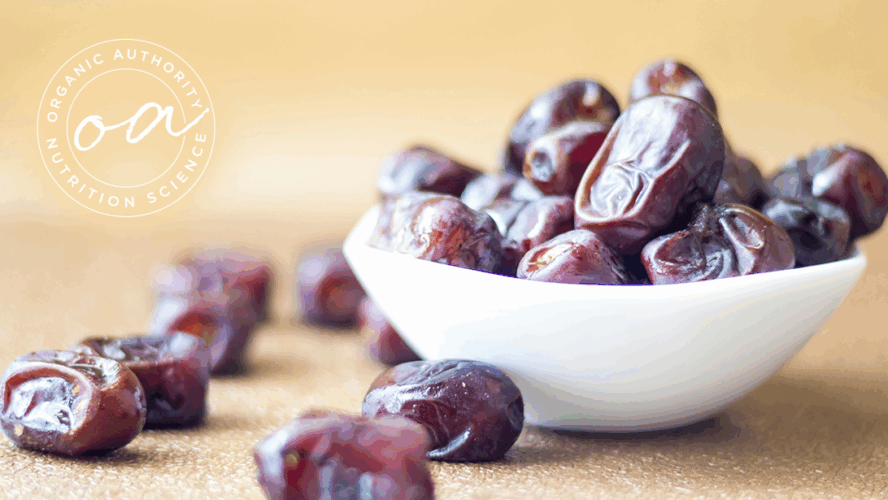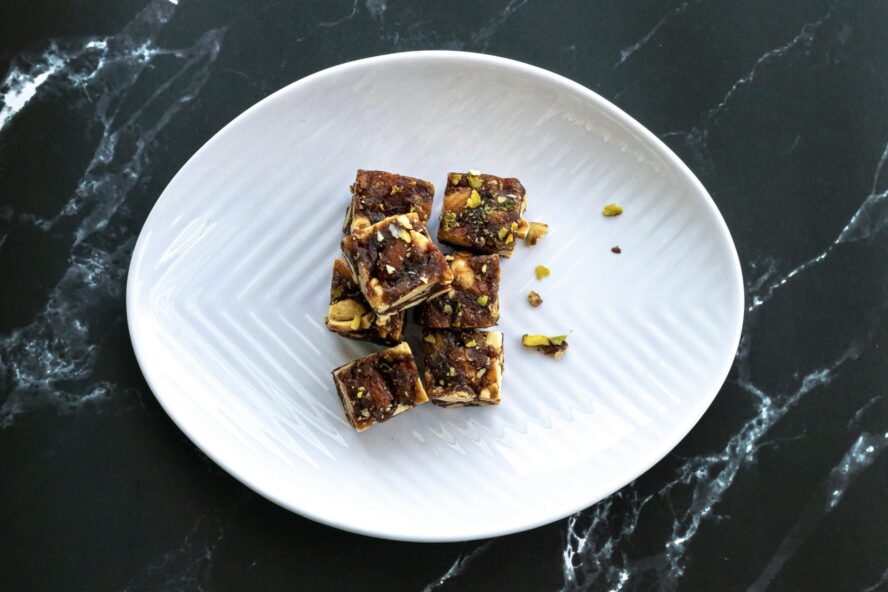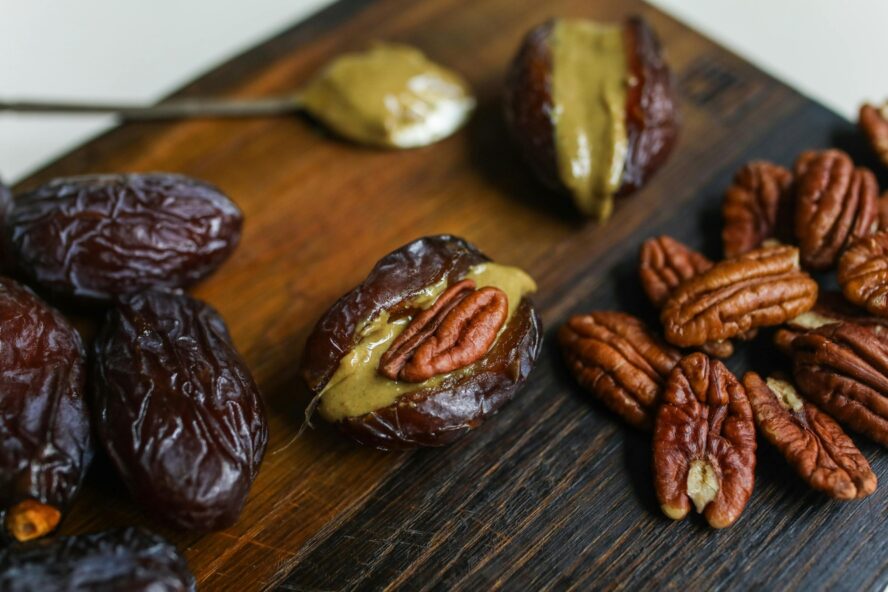Are Dates Good for You? What You Need to Know About These Dried Fruits
Normally with foods this sweet, we’d tell you to steer clear. Here’s why we’re making an exception for dates.

Craving something sweet, but worried about your blood sugar? Ditch the processed treats and grab a couple of dates instead.
But how does that work as a substitute, you might ask? Isn’t the sugar content of dates still really high? Are dates good for you? Well, these are fair questions, because it’s true — dates do contain a good amount of sugar. In fact, they’re actually nearly 80% sugar. So what’s the deal?
Keep reading to learn about the fascinating contradiction of dates that defies everything we know about sugar, plus the additional health benefits that come with their jam-packed nutritional profile — all to answer the key question: Are dates healthy for you?
Why Dates Aren’t Like Other Foods High in Sugar
As you likely know, sugar gets a pretty bad rap in health and wellness circles. And it’s not for no reason — most sugary foods spike blood sugar levels, causing an insulin surge and subsequent energy dip. These dips can trigger mood swings, cravings, hormonal imbalance, and weight gain. Excess glucose from sugary foods is also typically converted into fats in our blood, which ultimately can cause inflammation and contribute to our risk of metabolic disease. Overall, you can probably understand sugar’s negative reputation.
But here’s the shocking thing: none of that applies to dates! The science shows that despite their sugar content, dates don’t cause high blood sugar or any other negative effects on our metabolism1.
In fact, researchers conducted a study in 2020 on 100 individuals with type 2 diabetes — a population that technically should be extra sensitive to sugar. They were randomly split into groups: one group who ate three dates daily, and one group that avoided dates altogether. After 16 weeks, the study found that dates didn’t cause a change in blood sugar, despite their diabetes. Even better, those who consumed the dates actually had fewer triglycerides (fats in the blood) and a higher quality of life.

While dates come in various shapes, sizes, and textures (this particular study was conducted using Khudary dates), the nutrition content in dates include fiber, potassium, and other health-boosting antioxidants. Whatever your favorite type of date, this study should inspire you to enjoy them guilt-free as a snack, topping, or versatile recipe sweetener.
Dates Are a Nutritional Powerhouse
Part of the reason why the sugar content of dates seems to not have the traditionally negative effects associated with sweet foods is because they have so many other nutritional benefits to offset the sugar. A single date’s nutritional data includes at least 15 minerals, more than 20 different amino acids, and 6 vitamins, not to mention their antioxidants and dietary fiber.
There are also many different types of dates, often classified by texture. Some of the most popular varieties include Medjool, Deglet Noor, Ajwa, and Barhi. Not only do these types vary in size and flavor, they also offer slightly different nutrient content. To give you a sense of this variation, the table below compares Medjool and Deglet Noor nutrition facts for dates to other dried fruits2,3,4,5,6.
| Nutrient | Per pitted Medjool (24g) | Per pitted Deglet Noor (7.1g) | Per dried prune (8g) | Per dried fig (8g) | Per 14g raisins |
| Calories | 66.5 | 20 | 19.2 | 22.2 | 41.9 |
| Protein (g) | .43 | .17 | .174 | .264 | .462 |
| Total Fat (g) | .03 | .02 | .03 | .07 | .03 |
| Carbohydrate (g) | 18 | 5.32 | 5.11 | 5.11 | 11.1 |
| Fiber (g) | 1.61 | .56 | .568 | .784 | .63 |
| Sugar (g) | 16 | 4.5 | 3.05 | 3.83 | 9.12 |
| Calcium (mg) | 15.4 | 2.77 | 3.44 | 13 | 8.68 |
| Iron (mg) | .21 | .07 | .07 | 0.162 | .25 |
| Magnesium (mg) | 13 | 3.05 | 3.28 | 5.44 | 5.04 |
| Phosphorus (mg) | 14.9 | 4.4 | 5.52 | 5.36 | 13.7 |
| Potassium (mg) | 167 | 46.6 | 58.6 | 54.4 | 104 |
| Sodium (mg) | .24 | .14 | .16 | .8 | 3.64 |
| Zinc (mg) | .1 | .02 | .03 | .05 | .05 |
| Folate (mcg) | 3.6 | 1.35 | .32 | .72 | .7 |
| Beta-carotene (mcg) | 21.4 | .426 | 31.5 | .48 | 0 |
| Vitamin A (IU) | 35.8 | .71 | 10.3 | 0 | 0 |
| Lutein and zeaxanthin (mcg) | 5.52 | 5.32 | 11.8 | 2.56 | 0 |
| Vitamin K (mcg) | .648 | .192 | 4.76 | 1.25 | .49 |
| Selenium (mcg) | N/A | .21 | .02 | N/A | .08 |
| Choline (mg) | 2.38 | .447 | .8 | 1.26 | 1.55 |
Dates of the Medjool variety are much larger than Deglet Noor dates, so it makes sense that they contain more total sugar, calcium, iron, potassium, and beta-carotene, among other nutrients. However, when compared gram for gram, these two types of dates contain comparable nutrients. Prunes and figs are also comparable to dates in many ways, although dates and raisins contain significantly more sugar. Notably, raisins also do not contain any of the antioxidants vitamin A, beta-carotene, or lutein + zeaxanthin.
It’s also worth noting that although we’ve used data on conventional dates in the comparison table above, organic dates (which are grown without synthetic pesticides and fertilizers) may often contain an even higher antioxidant content because of this more natural growth process7.
The Top 6 Science-Backed Health Benefits of Dates
Dates are often praised as a natural alternative to sugar and other more processed sweeteners, but we don’t celebrate them enough for their standalone benefits. Here are some of the incredible date’s most winning qualities.
1. Digestive health and fiber content
Dates contain natural sugar, which is easy to digest, and both soluble and insoluble fibers, which can promote healthy digestion8.
A 2024 study review in the World Journal of Diabetes reports that the combination of healthy fiber and antioxidants found in date fruits can help improve the gut microbiota, which in turn can improve metabolic health, reduce inflammation, and reduce risk of chronic diseases like diabetes9.
2. Antioxidant protection and disease prevention
Research shows that dates contain the highest concentration of polyphenols among dried fruits10.
These phenolic compounds, along with their beta-carotene content, provide the antioxidant properties that help date fruits reduce free radical damage to cells. Over time, this can also help reduce risk of chronic disease.
3. Heart health and cholesterol management

Dates include polyphenol antioxidants that show potential to help reduce total cholesterol and increase HDL “good” cholesterol levels11.
A 2025 systematic review and meta-analysis of randomized trials in the Pakistan Journal of Medical Sciences shows that regular intake of dates could actually lower total cholesterol12. Furthermore, the flavonoid antioxidants in date fruits, as well as their fiber content, show promise to lower risk of vascular disease13.
4. Brain health and cognitive function
Dates contain dietary fibers known as beta-glucans, which can support metabolic health. By boosting our metabolic health, these beta-glucans (alongside the rich antioxidant content of dates) can also indirectly support cognitive function14,15.
5. Natural energy and blood sugar regulation
You’ve already learned how much sugar is in a date, and it’s technically something to still be conscious of. However, research shows that despite the high sugar content of dates, their nutrient density and antioxidant content seems to offset the sugar16.
In fact, the high carbohydrate content (glucose and fructose) content of dates makes them a good source of natural energy. They also have a low glycemic index (GI), meaning they don’t cause rapid spikes in blood sugar. And their dietary fiber content helps slow down the absorption of sugar and regulate blood glucose levels.
6. Bone health minerals
Dates’ health benefits for bones stem from their vitamin B, calcium, and magnesium content17. Also, the vitamin K content of date fruits can help regulate bone metabolism and blood calcium levels18.
A Sustainable Sweetening Solution
Beyond the nutritional benefits of eating dates, there are also environmental benefits of using dates as a sweetener over refined sugars. Research shows that sugar cultivation has caused significant habitat fragmentation and biodiversity loss over the years, which has led to land use changes, water uptake, and agrochemical runoffs19. Not to mention that there are reports of significant water, soil, and air pollution from sugar mills into local regions where sugarcane is cultivated.
To further protect the environment while improving your nutrient intake, choose organic dates. Date palms can be cultivated in the early spring or fall seasons, and organic dates are never genetically modified or sprayed with pesticides that can alter the antioxidant content of the fruit20. Throw your organic dates into a blender or food processor and make a pureed date blend to be added to shakes, smoothies, sauces, baked goods, ice cream, and more.
Choosing and Using Dates
Now that we’ve answered the question, “How healthy are dates?”, let’s talk about how to choose quality dates when grocery shopping. Experts report that dates are at their peak of taste and texture when in the “tamar” stage of ripening21.
This stage will look different depending on the type of date, but there are a few key things to look for in a ripe date. The dates you pick should be plump, shiny, and slightly wrinkled, but not too wrinkled22. For maximum freshness, store dates in an airtight container in the refrigerator (we love Caraway’s food storage, which we’ve reviewed in depth here). You can also store dates in the freezer for up to one year23.
Creative Ways to Use Dates

Once you’ve picked your preferred dates, it’s time to come up with tasty ways to eat and use them. Dates have a variety of applications, from the simplest to the most involved.
One of the best ways to eat dates is to just slice them open and stuff them with chocolate or peanut butter for an easy snack. Bonus: pairing dates with foods that include fat, fiber, and protein (like nuts and nut butter!) helps further regulate blood sugar and keeps you feeling full for longer. They also make great toppings for oatmeal, cereal, or pancakes and waffles. And don’t feel like you’re limited to desserts with dates — they make great savory appetizers when stuffed with nuts or cheese.
Recipes to Try with Dates
- Mint Chocolate Shake with Spinach and Collagen Powder
- Vegan Peanut Butter Granola
- Homemade Snickers Squares
- Vegan Carrot Cake with Dates and Pineapple
- Non-Dairy Vegan Hazelnut Milk
- Vegan Gluten-Free Brownies with Dates, Figs, and Coconut
Can You Eat Dates Every Day?
With so many ways to use dates, we wouldn’t blame you for wanting to eat them every day. And given their nutrient density, you absolutely can! But like with any food, it’s smart to moderate your daily intake. To reap the health benefits of dates without consuming too much sugar and calories, a healthy portion of dates should be between two and four dates.

Remember that dates also vary in size depending on the type of date, so be mindful of that when considering your portion size. Since Medjool dates are larger and slightly higher in sugar, just a couple of them might make a reasonable portion. On the other hand, you can probably have up to four of the smaller Deglet Noor dates as a portion.
Considerations and Cautions
Although we’ve mentioned that studies show dates don’t spike sugar levels, that doesn’t mean you should treat dates as a free-for-all. Everyone should approach their intake in moderation, and there are still some people who should limit or entirely avoid eating dates for their own safety. This includes people with asthma or a sensitivity to sulfites, which are found in dried fruits; those with fructose sensitivity like a Hereditary Fructose Intolerance (HFI); and those with kidney disease who should limit their potassium intake24,25.
And as evidenced in the study conducted on individuals with Type 2 Diabetes, while it’s always best to err on the side of caution, dates can be suitable for those with diabetes to consume in small portions as part of a diabetes-friendly diet.
The Final Verdict: Are Dates Healthy for You?
Now that we’ve dug into the nutritional facts and health benefits of dates, there’s one final question we have to answer: Are dates healthy? The answer is a resounding yes.
Not only are dates rich in fiber, but they also contain a good source of antioxidants, potassium, and magnesium, among other nutrients. Their natural sugar content provides a sweet, palatable taste without raising your blood glucose levels. The next time you’re at the supermarket, reach for a box of organic dates for a sustainable, healthy, and indulgent snack!
Sources:
- https://pmc.ncbi.nlm.nih.gov/articles/PMC7019638/
- https://fdc.nal.usda.gov/food-details/168191/nutrients
- https://fdc.nal.usda.gov/food-details/171726/nutrients
- https://fdc.nal.usda.gov/food-details/2709211/nutrients
- https://fdc.nal.usda.gov/food-details/2709204/nutrients
- https://fdc.nal.usda.gov/food-details/2709212/nutrients
- https://www.mayoclinic.org/healthy-lifestyle/nutrition-and-healthy-eating/in-depth/organic-food/art-20043880
- https://academic.oup.com/ijfst/article/56/4/1503/7805853
- https://iadns.onlinelibrary.wiley.com/doi/full/10.1002/efd2.70055
- https://pmc.ncbi.nlm.nih.gov/articles/PMC3992385/
- https://pmc.ncbi.nlm.nih.gov/articles/PMC8125345/
- https://pmc.ncbi.nlm.nih.gov/articles/PMC11755313/
- https://pmc.ncbi.nlm.nih.gov/articles/PMC8125345/
- https://pmc.ncbi.nlm.nih.gov/articles/PMC9954972/
- https://pmc.ncbi.nlm.nih.gov/articles/PMC9750914/
- https://pmc.ncbi.nlm.nih.gov/articles/PMC11229973/
- https://pmc.ncbi.nlm.nih.gov/articles/PMC11229973/
- https://pmc.ncbi.nlm.nih.gov/articles/PMC10097306/
- https://pmc.ncbi.nlm.nih.gov/articles/PMC11621753/
- https://pmc.ncbi.nlm.nih.gov/articles/PMC10814746/
- https://pmc.ncbi.nlm.nih.gov/articles/PMC10379225/
- https://www.epicurious.com/ingredients/how-to-buy-and-store-medjool-dates-deglet-noor-recipes-article
- https://fruitsandveggies.org/fruits-and-veggies-101/medjool-dates-nutrition-selection-storage/
- https://www.mayoclinic.org/fructose-intolerance/expert-answers/faq-20058097
- https://my.clevelandclinic.org/health/diseases/11323-sulfite-sensitivity

